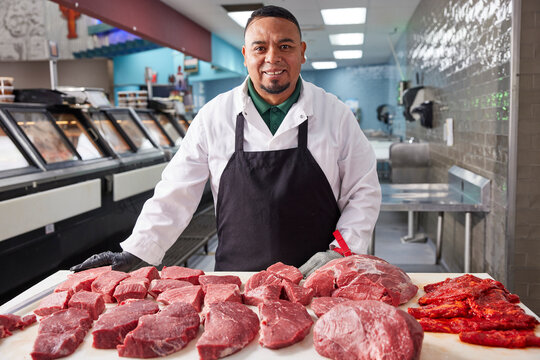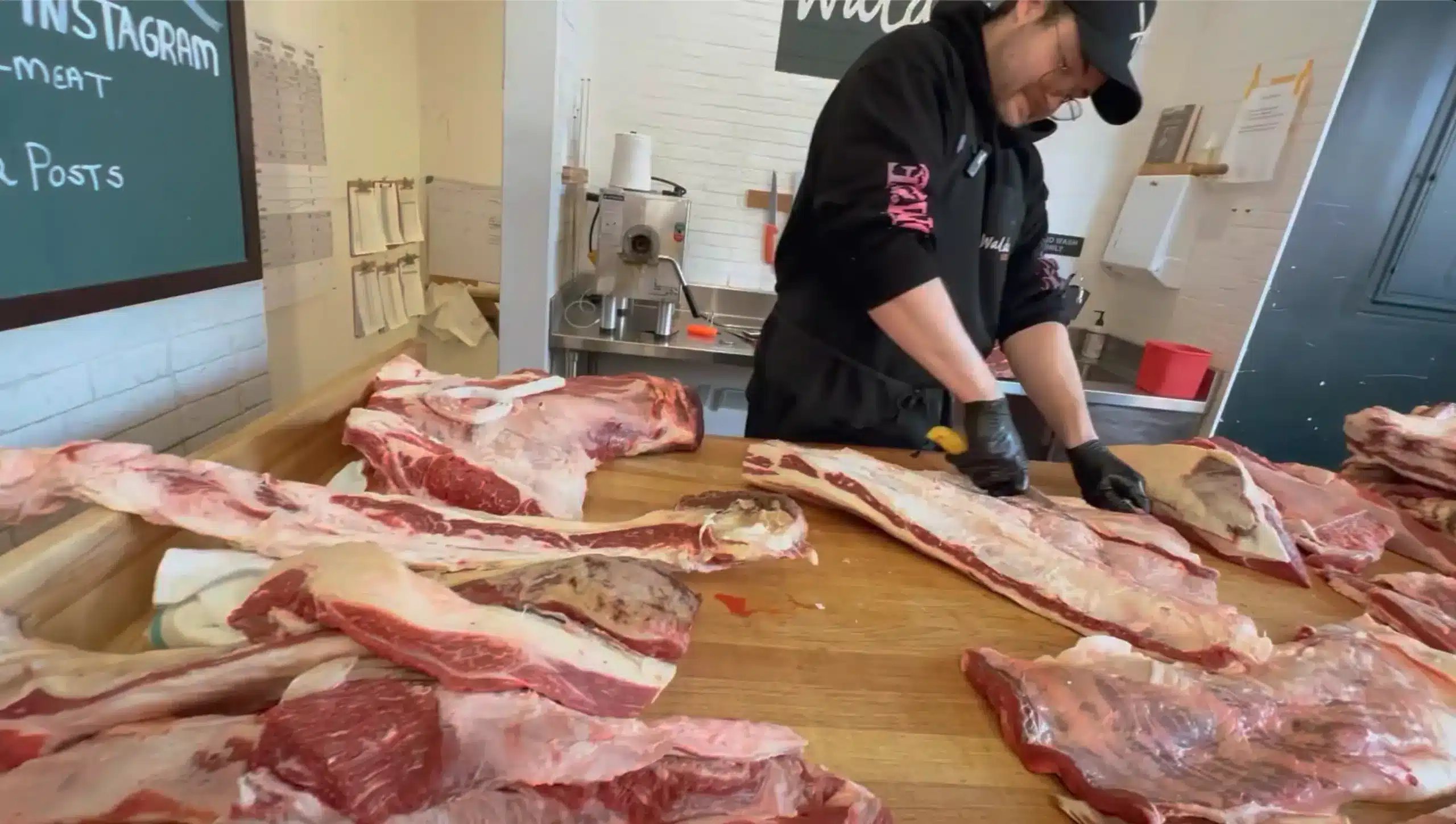Why bagleys edwardsville il a popular choice for local shoppers.
Wiki Article
All About Meat Markets: Recognizing Their Duty in Sustaining Local Farmers
Meat markets offer an essential feature in regional economic situations by linking the gap in between consumers and farmers. They use a direct sales channel that boosts the quality and quality of meat items. Past convenience, these markets play a considerable function in promoting sustainable farming and supporting the resources of neighborhood farmers. The effects of this relationship extend better than one could anticipate, increasing concerns concerning sourcing techniques and consumer selections.The Significance of Meat Markets in Regional Economies
Usually forgotten, meat markets play a crucial role in strengthening local economies by sustaining farmers and producing work. These establishments act as essential intermediaries, providing a system for neighborhood producers to sell their products straight to consumers. By buying locally sourced meat, customers add to the sustainability of neighboring farms, guaranteeing their viability and advertising agricultural diversity.Meat markets create work possibilities, varying from butchers and sales team to management and logistics roles. This job production stimulates the regional economy, promoting a sense of neighborhood as locals involve with their community companies.
Furthermore, meat markets often draw in consumers who look for top notch, fresh products, which can bring about boosted foot web traffic and sales for surrounding services. Generally, the existence of meat markets can significantly boost local economic health and wellness, fortifying links between agriculture and area well-being while sustaining the resources of farmers.

Connecting Customers and farmers: How Meat Markets Operate
Meat markets function as essential centers that attach neighborhood farmers directly with consumers, assisting in a streamlined supply chain that profits both parties. By sourcing items from close-by farms, these markets ensure that consumers get fresh, high-grade meat while sustaining regional agriculture. The operation of meat markets entails developing partnerships with farmers, frequently enabling them to display their items and share their farming methods.Subsequently, consumers access to a varied selection of meats that reflect regional flavors and preferences. Transparency is an essential facet of these markets, as customers are often provided with details concerning the dealing with and sourcing of the meat. This straight connection fosters trust and commitment in between farmers and consumers, boosting neighborhood ties. Furthermore, meat markets frequently engage in advertising activities, such as farm-to-table occasions, which even more improve the customer's experience and awareness of neighborhood farming techniques.
Promoting Sustainable Farming Practices
Advertising lasting agriculture techniques is necessary for the future of food production and environmental health. By concentrating on ethical farming strategies, motivating biodiversity, and promoting for neighborhood and seasonal sourcing, the farming sector can substantially decrease its ecological footprint. These techniques not just sustain the environment however likewise foster a healthier relationship in between farmers and consumers.
Ethical Farming Methods
An expanding number of farmers are adopting ethical farming methods to improve sustainability and reduce environmental impact. These techniques focus on liable land management, lessening the use of chemical plant foods and pesticides, and embracing organic practices. Techniques such as plant rotation, cover chopping, and agroforestry not just boost dirt health and wellness however additionally advertise biodiversity. Additionally, farmers are significantly focusing on pet well-being by decreasing and supplying pasture-based systems confinement methods. By focusing on regional sources and area involvement, ethical farming fosters a resilient farming system. This change not just benefits the setting however additionally reinforces the connection between farmers and customers, urging notified getting choices that support lasting techniques. Eventually, these techniques offer to produce a more sustainable future for farming.
Biodiversity and Ecological Community Health And Wellness
While several agricultural techniques have actually historically focused on return over ecological balance, a growing acknowledgment of biodiversity's relevance has actually emerged amongst consumers and farmers alike. Biodiversity improves ecological community strength, supporting dirt health and wellness, pest control, and pollination. By integrating diverse plants and livestock, farmers can create much more stable ecological communities that decrease reliance on chemical inputs and improve total productivity. Sustainable agriculture methods that promote biodiversity not only shield natural habitats yet additionally add to the long-term feasibility of farming. Meat markets play an important role in this standard shift by promoting for neighborhood items that focus on environmental health and wellness. By choosing to source from ranches that welcome biodiversity, consumers can support techniques that ensure a lasting future for agriculture and the atmosphere.Seasonal and Local Sourcing
Seasonal and regional sourcing not only improves the quality of food yet likewise supports sustainable agriculture methods that benefit both consumers and farmers. By focusing on regional meat markets, consumers can attach straight with farmers, cultivating a feeling of area and count on. This design lowers the carbon impact linked with long-distance transportation, advertising ecological sustainability. Farmers take advantage of more secure revenues and a trustworthy market for their items, which urges responsible farming methods. In addition, seasonal sourcing motivates diverse agricultural methods, allowing farmers to turn plants and animals, thus keeping dirt health and biodiversity. In general, this method produces a more durable food system that aligns with the values of sustainability, high quality, and community support, strengthening the essential web link between customers and local farming systems.The Function of Transparency in Sourcing Meat
What elements add to customer rely on meat products? Openness in sourcing is an essential aspect. Customers increasingly inquire concerning where their meat comes from, consisting of the farms and practices involved in raising the pets. Meat markets that prioritize transparency often present clear labeling, outlining the resource and production approaches utilized. This visibility promotes confidence and allows consumers to make enlightened choices.
Additionally, transparent methods can consist of ranch check outs, partnerships with neighborhood farmers, and sharing tales about the pets and their environments. As customers come to be more informed about food sourcing, they have a tendency to prefer meat items from providers who are forthcoming with information. This need for transparency not only reinforces customer depend on yet additionally urges meat markets to establish honest partnerships with regional farmers. Eventually, openness sustains a cycle of liability, benefiting both customers and producers in the meat market.
Sustaining Pet Well-being Through Resident Sourcing
Supporting pet welfare with regional sourcing rest on the fostering of moral farming methods. By prioritizing openness in sourcing, customers can make enlightened choices that reflect their worths. In addition, area engagement initiatives foster a stronger connection between consumers and farmers, enhancing the overall dedication to gentle therapy of animals.Ethical Farming Practices
While customers significantly prioritize moral considerations check out this site in their food options, neighborhood sourcing supplies a feasible course to supporting animal well-being. Moral farming practices highlight humane therapy of animals, guaranteeing they have adequate room, correct nourishment, and access to outside settings. Regional farms frequently follow these criteria, as they are extra accountable to their clients and areas. By selecting to source meat locally, consumers can sustain farms that focus on sustainable and humane practices over industrialized methods, which commonly endanger pet wellness. This link fosters a deeper understanding of food production and urges responsible consumption. Eventually, neighborhood sourcing encourages customers to make enlightened choices that line up with their values pertaining to honest treatment of pets in the food market.Openness in Sourcing
How can openness in sourcing enhance customer count on regional meat markets? By supplying clear details concerning the beginnings of their products, local meat markets promote a sense of liability and stability. When consumers understand the sourcing techniques, including the treatment of animals and farming approaches, they are more likely to really feel certain in their getting choices. This transparency allows customers to straighten their worths with the businesses they support, knowing they are contributing to ethical animal well-being and lasting techniques. Furthermore, neighborhood meat markets can display collaborations with nearby farms, highlighting area assistance and enhancing a favorable connection in between consumers and manufacturers. Eventually, transparency in sourcing not only develops count on however additionally encourages informed selections amongst consumers.Neighborhood Involvement Efforts
What role do neighborhood interaction campaigns play in advertising animal welfare with regional sourcing? These initiatives noticeably boost recognition and understanding of moral farming techniques among consumers. By fostering links between regional farmers and neighborhood members, meat markets can stress the value of gentle therapy of animals. Educational workshops and farm scenic tours allow consumers to witness firsthand the problems under which animals are raised, enhancing the value of neighborhood sourcing. Additionally, neighborhood occasions, such as farm-to-table dinners, highlight the relationship between animal well-being and lasting practices. Through these engagements, consumers establish rely on local meat markets, motivating them to sustain moral fostering a society and sourcing of liable intake that prioritizes pet welfare in the neighborhood.Health Advantages of Deciding On Resident Meat Products
Picking regional meat items supplies various health and wellness benefits that can greatly improve overall health (farmer's meat market near me). One substantial advantage is the reduced time between ranch and table, which frequently leads to fresher meat with greater nutritional value. Regional meats often tend to be devoid of unsafe preservatives and ingredients typically located in factory-farmed choices, adding to a cleaner dietAdditionally, regional farmers usually prioritize humane and sustainable practices, bring about healthier animals that produce better-quality meat. Grass-fed and pasture-raised pets, frequently located in neighborhood markets, usually have higher degrees of omega-3 fats and lower degrees of hydrogenated fats compared to their barnyard equivalents.
Sustaining regional meat products cultivates neighborhood wellness by making sure that customers have accessibility to risk-free and sensibly sourced food. By selecting regional, people not only nurture themselves yet likewise add to the well-being of their neighborhood and setting.
Making Enlightened Selections at the Meat Market
When traversing a meat market, comprehending the crucial elements that influence high quality and sourcing can encourage consumers to make enlightened selections. Customers must focus on local items, which usually come from ranches with sustainable methods. Recognizing labels such as "grass-fed" or "natural" can also assist decisions, as these often suggest greater welfare requirements and nutritional advantages.Involving with the butcher is essential; knowledgeable team can supply understandings right into the sourcing of their meats and suggest cuts that match numerous cooking techniques. Consumers are motivated to ask about this the ranch's techniques, consisting of animal treatment and feed.
Furthermore, examining the meat's shade and appearance can disclose freshness and high quality. Lean cuts must show up damp and brilliant, while fatty cuts must have a marbled appearance. By combining these methods, consumers can confidently pick meats that line up with their values and assistance neighborhood farming.
Often Asked Concerns
What Types of Meat Are Most Typically Cost Local Meat Markets?
Local meat markets usually supply a range of meats, consisting of beef, lamb, pork, and poultry. These facilities typically include specialty cuts, sausages, and in your area sourced items, accommodating varied cooking choices and customer demands.Exactly How Can I Discover a Meat Market Near My Place?
To discover a meat market close by, one can utilize on the internet maps, search link engines, or regional directory sites - bagley's meat market. In addition, asking next-door neighbors or friends for recommendations usually generates useful understandings into the very best local choices offeredExist Seasonal Variations in Meat Schedule at Meat Markets?
Seasonal variants in meat accessibility at meat markets commonly occur, influenced by aspects such as neighborhood farming techniques, animal reproduction cycles, and seasonal demand. This can impact the types and amounts of meat offered throughout the year.Do Meat Markets Deal Unique Promos or Discounts for Bulk Purchases?
Meat markets frequently provide special promotions and price cuts for bulk purchases. This method motivates consumers to get larger quantities while enabling the markets to manage supply properly, profiting both consumers and business monetarily.Can I Ask For Particular Cuts of Meat at the Market?
Yes, clients can commonly ask for particular cuts of meat at the market. Lots of butchers want to suit special orders, ensuring that patrons obtain the precise cuts they want, tailored to their preferences.By sourcing items from close-by farms, these markets assure that consumers get fresh, premium meat while supporting local agriculture. By focusing on regional meat markets, customers can connect straight with farmers, promoting a sense of neighborhood and trust fund. How can openness in sourcing improve consumer trust fund in local meat markets? Local meat markets normally supply a selection of meats, including beef, pork, poultry, and lamb. Seasonal variants in meat availability at meat markets frequently occur, affected by elements such as neighborhood farming practices, pet breeding cycles, and seasonal demand.
Report this wiki page